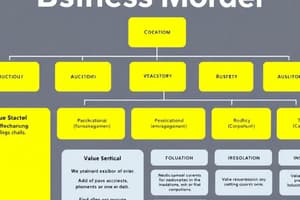Podcast
Questions and Answers
What is the primary purpose of a business?
What is the primary purpose of a business?
- To support governmental functions
- To meet the needs of employees
- To generate profit or provide goods and services (correct)
- To create a non-profit organization
Which of the following best defines an organization?
Which of the following best defines an organization?
- A group of individuals with no specific goals
- A collection of unrelated activities and tasks
- A purposeful group working towards specific objectives (correct)
- An informal gathering of people sharing ideas
Which of the following roles is primarily responsible for making strategic decisions within a business?
Which of the following roles is primarily responsible for making strategic decisions within a business?
- Customers
- Managers
- Entrepreneurs/Owners (correct)
- Employees
What distinguishes employees in a business based on job responsibilities?
What distinguishes employees in a business based on job responsibilities?
What role do managers play within an organization?
What role do managers play within an organization?
Which of the following correctly describes the role of suppliers in a business?
Which of the following correctly describes the role of suppliers in a business?
What is the primary focus of organizational behavior?
What is the primary focus of organizational behavior?
Why is effective communication critical among individuals in a business?
Why is effective communication critical among individuals in a business?
Behavior encompasses which of the following aspects?
Behavior encompasses which of the following aspects?
What is the significance of group dynamics in an organization?
What is the significance of group dynamics in an organization?
Flashcards
Business Definition
Business Definition
An organization focused on generating profit or providing services to a market.
Organization
Organization
A structured group of people working toward a common goal.
Individuals in Business
Individuals in Business
People playing various roles in an organization, contributing to its success.
Entrepreneur/Owner
Entrepreneur/Owner
Signup and view all the flashcards
Employee
Employee
Signup and view all the flashcards
Manager
Manager
Signup and view all the flashcards
Investors/Shareholders
Investors/Shareholders
Signup and view all the flashcards
Customers
Customers
Signup and view all the flashcards
Suppliers
Suppliers
Signup and view all the flashcards
Regulators/Government Officials
Regulators/Government Officials
Signup and view all the flashcards
Behavior
Behavior
Signup and view all the flashcards
Organizational Behavior
Organizational Behavior
Signup and view all the flashcards
Individual Organizational Behavior
Individual Organizational Behavior
Signup and view all the flashcards
Group Dynamics
Group Dynamics
Signup and view all the flashcards
Study Notes
Business Definition
- A business is an organization or entity involved in commercial, industrial, or professional activities.
- Its primary goal is to generate profit or provide goods/services to a specific market segment.
- Businesses involve production, distribution, and exchange of products/services.
- Resources like capital, labor, and technology are essential for effective operation and achieving financial goals.
- Businesses encompass various sizes, from small local enterprises to large multinational corporations.
Organization
- An organization is a structured group of individuals/entities uniting to achieve specific goals or objectives (tasks, projects, a common mission/vision).
- Organizations can be businesses, non-profits, government agencies, educational institutions, or community groups.
- Organizations typically have a defined structure with roles, responsibilities, and hierarchies to efficiently allocate resources and coordinate efforts.
Individuals in Business
- Individuals in business encompass people playing various roles and functions within a business/organization.
- These individuals contribute to the organization's operations, growth, and success by performing specific tasks and responsibilities.
Key Categories of Business Individuals
- Entrepreneurs/Owners: Initiate, establish, and often own businesses, taking financial risks and making strategic decisions.
- Employees: Hired for various job roles (entry-level, mid-level, senior-level) based on job responsibilities and experience.
- Managers: Oversee and direct employee work, encompassing different levels (frontline supervisors, middle managers, top executives) depending on their responsibility scope.
- Investors/Shareholders: Invest capital by purchasing shares or providing funding, holding a financial stake in the organization's success.
- Customers: Individuals or entities purchasing products/services, vital for a business's sustainability and growth.
- Suppliers: Provide necessary goods, materials, or services to the business, crucial for maintaining supply chains and production processes.
- Regulators/Government Officials: Ensure businesses comply with laws and regulations, issuing licenses, conducting inspections, and enforcing compliance.
Importance of Collaboration
- Business success often depends on how well individuals work together and collaborate towards common goals.
- Effective leadership, communication, and teamwork are essential to achieving business objectives and meeting stakeholder needs.
Behavior Definition
- Behavior encompasses the actions, reactions, conduct, or activities of living organisms.
- It includes simple movements/responses to complex social interactions.
- Behavior can be observed and analyzed to understand interactions with the environment, each other, and themselves.
- It is a fundamental concept across various fields (psychology, sociology, biology, economics).
Organizational Behavior
- Organizational behavior studies how individuals and groups interact within an organization.
- It analyzes how these interactions impact organizational performance towards its goals/objectives.
- Individual organizational behavior focuses on the study of employee behavior and interaction within the workplace.
- It's a subfield of organizational behavior focusing on understanding individual employee actions, attitudes, and psychological processes.
Group Dynamics
- Group dynamics studies behaviors and interactions within groups of people.
- It examines how individuals relate, communicate, influence each other, and collaborate towards shared goals in various contexts.
- Key concepts include leadership (influencing group dynamics through leadership styles), and communication (essential for group effectiveness and cohesion).
Studying That Suits You
Use AI to generate personalized quizzes and flashcards to suit your learning preferences.




